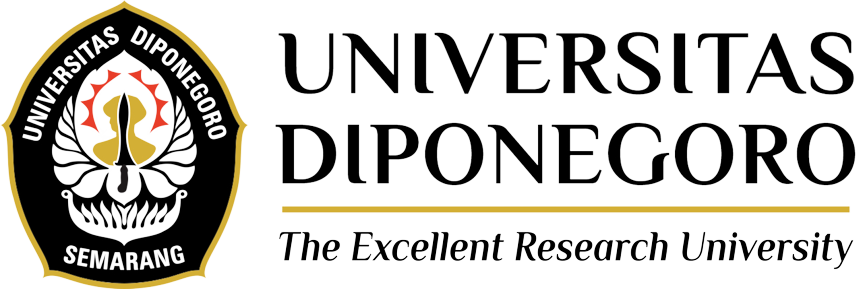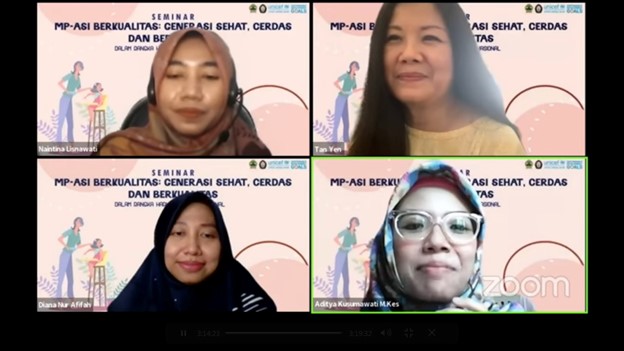SEMARANG — The Research Institute and Community Service (LPPM) of Diponegoro University (Undip) and the United Nations International Children’s Emergency Fund (UNICEF) held a seminar with the theme “Complementary Food for Quality Breast Milk (MP-ASI): Healthy, Smart and Good Quality Generation” as a series of activities to commemorate National Health Day. The seminar which was conducted through Zoom application and broadcasted on Undip TV Youtube channel provided an important guide for mothers on how to prepare a healthy, smart and good quality generation in the midst of changing times.
The two speakers presented in this event were Nutrition and Health Expert, Dr. sr. Tan Shot Yen M.Hum., and Head of Nutrition Undergraduate Study Program of Faculty of Medicine Undip, Dr. Diana Nur Afifah, STD, M.Sc. The seminar which was attended by participants from various regions in Indonesia was guided by lecturer of Faculty of Public Health Undip, Nain Tina Lisnawati, S.K.M., M.Gizi.
Deputy Chairman of LPPM Undip, Prof. Dr. Rahayu, S.H., M. Hum. welcomed the activities in collaboration with UNICEF which always supports LPPM Undip. According to her, the activity which discussed about complementary food for babies is very important because at this time mothers and children are facing very different times and conditions with mothers from the older generation.
“This gap of knowledge also happened to me when I was facing my grandson. It used to be 30 years ago when I took care of my two children, I felt that taking care of children was simple with only a simple food menu. It’s different when facing grandchildren who find it difficult to eat, even though nutritional food has also been given. Maybe the times were different, so this activity is expected to provide information for mothers on how to give complementary food without stressing the mother. I also hope that this activity will really provide benefits and new lessons for all participants,” said Prof. Dr. Rahayu, when opening the webinar, on Saturday (27/11/2021).
Meanwhile, Karina Widowati from UNICEF Indonesia Representative in Surabaya, emphasized the importance of activities like this for parents to help babies under five years old (toddlers) to grow and develop optimally. It is stated that UNICEF and WHO have agreed to provide global recommendations on the provision of ideal food for children or toddlers so that they can grow optimally and develop their potential.
There are five global recommendations from UNICEF and WHO on ideal child feeding. First, Early Initiation of Breastfeeding in the first hour of birth. “This can improve health, growth and development, as well as build immunity systems or antibodies in babies. Then, breast milk is also very good for the health of the baby’s digestive system,” said Karina.
Second, Exclusive Breastfeeding <6 months or exclusive breastfeeding by mothers to babies for 6 months. This is very important, because it can protect babies from the risk of acute infections such as diarrhea, pneumonia, ear infections, haemophilus influenzae, meningitis and urinary tract infections. “Exclusive breastfeeding also protects babies from chronic diseases in the future such as diabetes mellitus type 1,” she added.
Third, Introduction of Solid, Semi-solid or Soft Foods 6-8 months which means introduction of soft foods in infants aged 6 to 8 months. “So at this age, children are introduced to new foods, not only eating liquid food. The goal is to introduce adult food to babies.”
Fourth, complementary feeding for babies aged 6 to 23 months. This additional food becomes very important to meet the nutritional needs of infants. Fifth, Continued Breastfeeding for babies from 12-23 months when mothers continue breastfeeding and providing additional food to meet excellent nutritional foods for child growth and development.
“These five recommendations can help our toddlers to grow and develop in the future. These five recommendations can also prevent stunting in children caused by malnutrition. Since the average cases of children at risk of stunting caused by acute malnutrition in the first 2 years,” explained Karina.
It was also in line with the material conveyed by Dr. dr. Tan Shot Yen, M. Hum. In her presentation, it was said that for a mother, giving complementary foods to breast milk (MP-ASI) is a valuable journey that cannot be repeated. Children who grow up healthy starting from the provision of good complementary feeding will be a healthy and intelligent future generation, a valuable investment for the progress of a nation.
She added that the provision of MP-ASI is not only a matter for child specialists. Preparing MP-ASI does not have to be done luxuriously and excessively. There is no need to distinguish between the baby’s menu and the family’s menu. “What parents eat is what the baby eats, for example, the menu at home is pumpkin vegetable, the baby is given pumpkin too, only the process is separated,” she added.
Tan Shot Yen reminded that every mother and child should be given a book on Maternal and Child Health (KIA) or often called as pink book. It is a guide book compiled by 13 health organizations. “Parents can use this book to see or measure their children’s growth and development in every week,” she explained.
In line with dr. Tan, Dr. Diana Nur Afifah, STD, M.Si also said that children who grow up healthy start from the provision of good complementary foods, It plays a great role in producing healthy and smart future generations. Thus, Dr. Diana reminded that mothers must ensure the cleanliness and safety of the food that will be given to the baby. “We have to ensure that the food we prepare is safe for our babies to consume,” she said.
There are 5 ways to store food properly so that its nutritional content is maintained and its safety is guaranteed. First, food must be kept clean and in a clean place. Then keep the food frozen. Third, stored food must be cooked. “It must be cooked until well, not half-baked,” she said.
Furthermore, food must be stored at a safe temperature, it can be stored in a dry food cabinet or refrigerator. Lastly, wash food using clean water. “In this way, mothers can provide safe and healthy food for their children. So the children can grow optimally and develop their potential well,” she concluded. (PR team)

